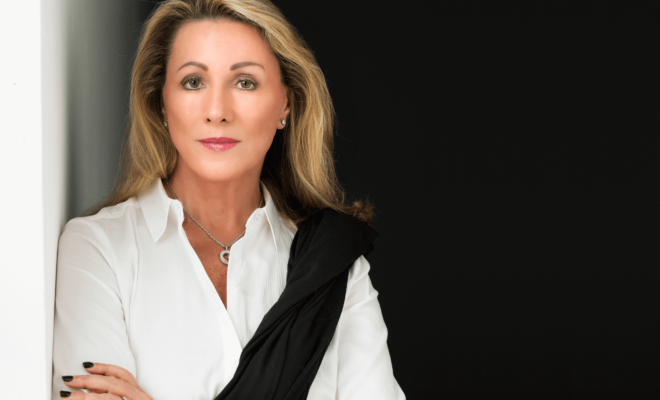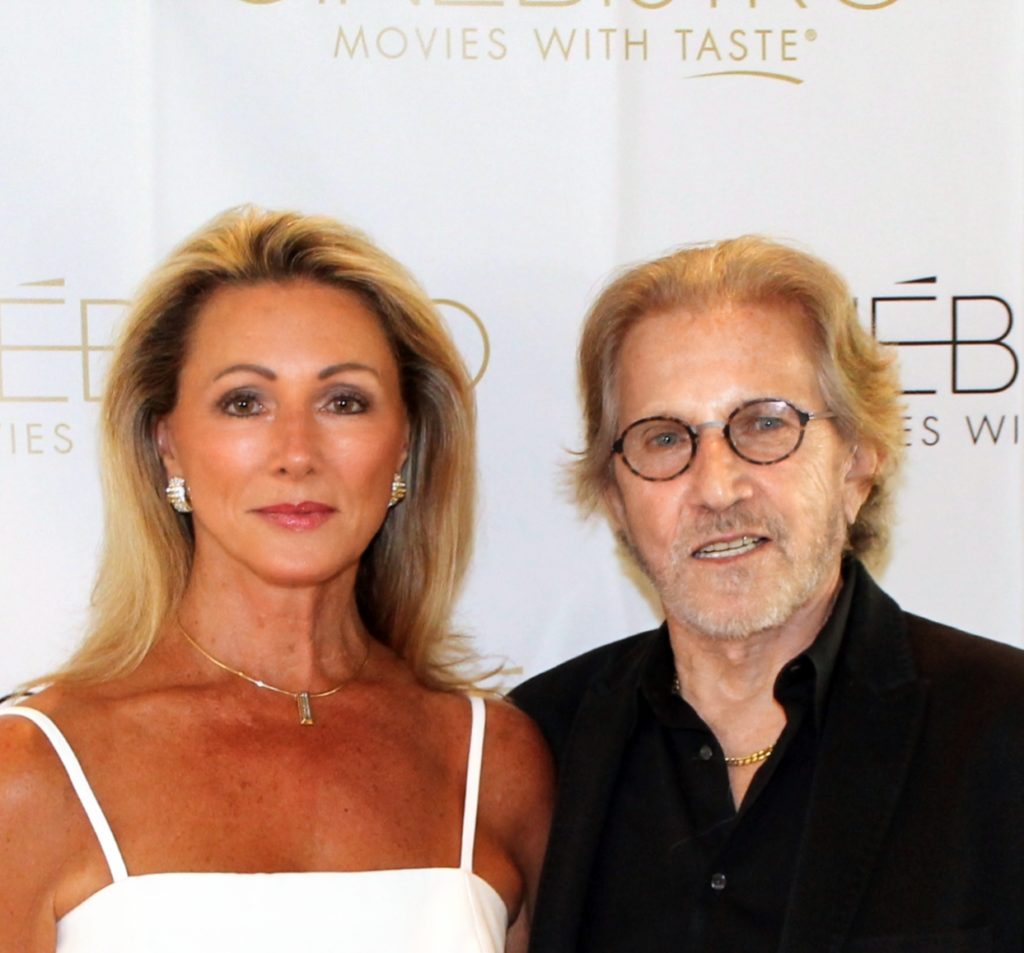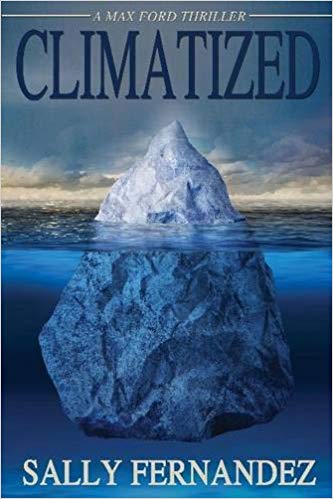
Literature
Scenes From an Interview with Sally Fernandez
Writing The Time of Her Life
by Gus Mollasis
She does the one thing that all writers must do. The good ones, the bad ones and the legendary ones. She finds, makes and takes the time to write. Not as a whim, a duty or merely a hobby, but more as a calling with the discipline of Marine’s rigid routine. She does it because it is what she loves to do and because it is the right thing to do. For six hours every day, Sarasota resident Sally Fernandez sits down and pounds out the words that over the last ten years or so have turned into six books including “The Simon Tetralogy” – Brotherhood Beyond the Yard, Noble’s Quest, The Ultimate Revenge and its aftermath, Redemption. Her latest works, Climatized and The Beekeeper’s Secret, the first two books of the “Max Ford Thriller” series featuring Maxine Ford as the female protagonist, are being turned into major motion pictures. Not bad for a woman seasoned in the business world who, less than 11 years ago had never written down a word for the world to see. Today, this world traveler and superhero-like writer joyfully performs her daily routine with her content editor and husband of over thirty years, Joe, by her side. Together they peruse the pages, the prose and the plot lines until they are just right. As I sat down in their beautiful West of the Trail home, I couldn’t wait to view some scenes from an interview of Sally Fernandez’s life.
Where were you born?
Bath, Maine. I’m 11th generation from the state of Maine.
Write the opening sentence of your biography that best describes your childhood.
It was the worst of times and now life is the best of times.
Did you read a lot as a child?
I didn’t read a lot until I got into high school. My mentor and aunt, Dr. Patricia Ames, encouraged me to read. Ironically, the first books that she gave me were John Jakes’ The Kent Family Chronicles, and today here I am hanging out with John Jakes. That sparked my interest in reading something where facts were twisted in with fiction. I learned about the Revolutionary War and American history through John Jakes because I was so excited about the families he was creating. It became my style of writing – which is to entertain through a fictional plot while also learning something.
How did your experiences and successes in the banking world prepare you to become a page-turning author?
The organizational skills from banking, project management and technology fields I worked in prepared me for my life as an author. I didn’t realize I had the creative skills. I would come up with a summary, fill in the facts and come up with a conclusion. I’m very organized and highly disciplined.
Describe the impact on your writing of living in glamorous eclectic locations like New York, San Francisco and Hong Kong.
The exposure to other cultures and people, from archeological digs to scientific expeditions and safaris, I incorporated all of those life experiences into my writing.
Around 2007-08, world and political events combined with media coverage prompted you to become a writer. Tell us about that.
We were in our home in Florence, Italy, listening to news reports on the 2008 election and it was hard to dissect what was real and what were the real issues. And that’s kind of when I started writing my rant, and when Joe, who didn’t know at the time that he would become my editor, just challenged me to put it down on paper. That was the moment I discovered I loved creative writing. I took one issue – whether Obama was an illegal immigrant or not – kind of tongue and cheek and wrote a scenario that I became engrossed with that allowed me the opportunity to talk about the banking crisis, computer hacking, and terrorism infiltrating the government. It was a way to incorporate some issues that were really happening into a plot and that’s the moment when I said “wow.” I was hooked. That was the start of the first book, Brotherhood Beyond the Yard, and I already had my next book in my head.
So, up to that point you hadn’t really written anything, not even a short story?
I wrote 50 pages nonstop and gave it to Joe. He read it and said, “I think you have a nucleus of a book here.” Still, the book required a lot of research to add to the plausibility of the plot. So I went back to the keyboard. I didn’t want to show it to Joe until it was completed. Four months and 88,000 words later, I handed him a stack of papers. That was my first novel and the first time Joe saw the whole book.
How accepting were you of Joe’s red pen?
Very accepting. Obviously, you’re going to have differences of opinions at times, but I wanted to make my first novel the best book that it could be and I knew that he was only going to help me. He would write a lot at times and I would say hold off, just tell me what you don’t like about it and I’ll go fix it, as opposed to the tendency to re-write. We kind of got our mojo going and he would offer suggestions and I’d go back and rework it. It was a collaboration and I don’t ever recall a major disagreement. At times, Joe would say that he disagreed. That’s when it got interesting. I have a group of readers that after the manuscript is completed, I have them read it. Five people from totally different backgrounds and experiences that come at it from a unique place. If Joe and I disagree, we would agree to find out what the reader group says.
Joe: We keep the emotion out of it. That’s very important, and we accept each other for our knowledge and we discuss things at length.
Sally: Just don’t get us involved in a Scrabble game – but other than that, we’re good.
Is the writing for you as much therapy as it is a vocation?
Actually, it is. I love being in my cave and writing and letting my mind go. But then it becomes collaborative when we go into the editing stage.
You dove right in, first creating “The Simon Tetralogy” comprised of Brotherhood Beyond the Yard, Noble’s Quest, The Ultimate Revenge and Redemption. Are you surprised at how prolific a writer you’ve become?
I thought it would be one book. A lark. To the point that we self-published the first book. We figured that it was my first novel and was a lot of fun. Then four months later, David Dunham got his hands on the manuscript and decided to publish my book. It surprises me every time because when I know I’m ready for the next book, I always get that feeling of maybe I don’t have a story. And then the minute I start writing it just flows. I’m incredibly fortunate and am currently working on the synopsis for the seventh novel.

Tell us about the unique professional relationship you share with your husband Joe.
Because he’s so talented and knowledgeable, if Joe reads something and doesn’t get it, the readers aren’t going to get it. If Joe gets it then I’m going to be okay. There is the constant dialogue and discussion going back and forth as new chapters are written and plot points revealed. It’s fun and interesting because we’re both political junkies. Fernandez
Joe: I play the role of the perfect foil. I don’t accept the fiction as many readers do. I’m always questioning the plausibility of the plot. Now I’ve softened and have gone through a catharsis and am more accepting of the fiction. I’m still the foil. But I use a lot less red ink today than when we started. (They both laugh.)
Sally: It’s fun. I’m still learning. I’m self-taught. Fortunately there is spell check and so many tools available to me. I double check my grammar and everything. I don’t know how John McDonald wrote his books. Fernandez
In your bestselling book Climatized, we are introduced to Max Ford. Who is she and what does she stand for?
She’s actually my alter ego. I’m fantasizing one day that I will become a secret agent. She’s strong, independent and formidable. She has my mouth. I want her to be vulnerable and lethal in other ways. She can get out there and get to the heart of the issues. She’s not a “Super Woman” but a woman you can sit down and chat with over a glass of wine. She’s tough and kick-ass. Fernandez
The subject of climate change and global warming and its impact is a volatile subject. What was the advantage of addressing it in a fictionalized manner as you have?
There is so much misinformation between the rhetoric and the scientific facts. To write a book about what climate change is and how we do affect the climate or not is a heady topic in general. People say don’t talk about politics and religion at the dinner table. Now people also say don’t talk about climate change either. I wanted to create a fictional plot that would make it interesting to anyone and in the process have the characters debate the issues and point out the rhetoric and the scientific evidence, and let the reader decide what they believe about climate change. Fernandez
Tell us what you hope people will take away from reading Climatized?
My takeaway is for them to understand what the real issue is – that you can’t deny the climate. The climate changes. God’s in charge. Man is not in charge. We are spending so much time talking about CO2 in the air, where it’s not a problem. What we need to do is take that same money and stop polluting our waters and earth in other ways. There are ways that we can take care of our planet, but we’re arguing about the wrong things. Fernandez
You allude to a wonderful quote by Francis Bacon on fiction and the truth. How does it relate to Climatized?
Sometimes the truth is hard to tell and you need fiction to make it plausible. So, by taking Climatized where you have scientists dying because they have the real evidence and they’re supposed to testify, the fictional plot makes it interesting as we try to save the lives of scientists by running to Italy and all over the place. In the meantime, you throw in the facts and people say, “Wait a minute, if this scientist has the evidence and Max is going to go save him, what does he know? And by finding out what he knows, people get closer to the truth and find out that wow, that could be plausible. Fernandez
You’ve followed up Climatized with The Beekeeper’s Secret, in which you tackle another big topic and target “Big Pharma” and the FDA. Why them and why now for Max Ford?
The Beekeeper’s Secret was inspired by my publisher David Dunham. David was diagnosed with pancreatic cancer a few years ago and he chose to have the cancer removed through surgery and chose not have chemotherapy or radiation. Instead he used holistic medicine, and by detoxing and removing sugar and taking enzymes, he eradicated the pancreatic cancer. He was cancer-free. That kind of inspired us as we started looking into what radiation and chemotherapy was doing. We started following the money and found out that Big Pharma makes a hundred billion dollars a year in profits from chemotherapy and radiation alone. We also found there were a lot of alternate medicines that may work for some people. Looking at that and the role that the FDA plays, we discovered that Big Pharma contributes 771 million dollars to the FDA and taxpayers contribute 336 million dollars a year, which means that Big Pharma pays 71% of the FDA. So, when you start seeing independent corporations running a government entity, there is cause for pause. The fictional plot point in the story is that holistic doctors are dying and in reality some are mysterious deaths. It’s this big fight between alternative medicine and Big Pharma. Because you can’t patent natural remedies, there is no money in it. And if that takes away money from Big Pharma, the question becomes can they afford to find a cure for cancer? The takeaway from The Beekeeper’s Secret, and this is a quote from Joe, “You don’t rent your body, you own it for life.” And, “You are what you eat.” It tells people two things – take care of your body and when you have to go to a doctor, ask for second and third opinions.
Finish The Following Sentences:
Climatized is an important book because it…
Opens the eyes of the people as to what the real issues are, so that money, the attention and the discourse can be focused in a more productive manner.
The Beekeeper’s Secret is a good read because it…
Makes you more aware of what’s available to you in terms of taking care of your health and encourages people to ask the questions.
I love writing because…
It’s an escape from the day-to-day and it allows the creative juices to flow while highlighting important issues that they need to know.
A good writer should always…
Have a story to tell and be able to tell it in a captivating way while always adhering to the facts.
The hardest part of writing is…
That’s a tough one, because when I sit down to write it just flows. Fernandez
Tell us about how you write—the who, what, where of it?
I literally work out every morning, recording my thoughts as I work out. Then typically six to seven hours of non-stop writing in my office seven days a week whether here in Sarasota or in Florence. After I work six or seven hours writing, then it’s cocktail hour where Joe and I discuss things. Sorry Hemingway, I’ve never had a drop when I’ve been writing. Fernandez
What is the most difficult part of being a novelist and the greatest joy that it brings you?
The greatest joy is the end product and knowing that we have made an impact. The most difficult is that it does take away from the freedom that Joe and I had at one time to do extensive traveling. I get the joy, and Joe has made a lot of sacrifices. Fernandez
Is unveiling and writing Max like doing a jigsaw puzzle with the pieces being all there but you must find where they fit?
Generally I have the whole story in my head. Not all the pieces, but certainly how to get from the beginning to the end. In creating Max, I developed a back story for her that makes her vulnerable, and it’s fitting those pieces into the appropriate places in Climatized, The Beekeeper and the next one so that Max continues to grow with the readers without having to know everything about her up front.
Your books are being turned into major motion pictures. How does that feel?
Am I floating on the ceiling right now? Yes. It’s quite surreal. Things are moving fast and it’s very exciting. Not only that they’re being made into major motion pictures, but because the level of talented people involved and interested in working with this project is just phenomenal. Fernandez
You have a great team collaborating with you on bringing Max Ford to the silver screen. How much input do you have in the screenplay?
If a studio had optioned this, we’d have zero control. That’s not what’s happened here. Writers Noam Dromi (Dolphin Tale) and Evan Greene were brought in to develop the project as was Stuart Pollack, an international lawyer who’s also a writer and director responsible for seeking fundraising and financing. With the three of them, myself and Joe, we are now the team. Evan and Noam wrote the script and we finalized it after making some changes. Clearly when we get a director, the director will want to make changes. Fernandez
Recently you lost your friend, colleague, and publisher David Dunham, a man who really believed in you and what you wrote down on empty pages. Do you still feel his presence in the project?
He’s a big loss. David literally took me under his wing, had confidence in my books and has been there from book one all the way through to the last one. He would have been working on the next one. He’s the one who introduced me to Noam; that started the whole movie project. As I said in one of my dedications, he was going to work with me on the book and the film, and we were going to walk down the red carpet together. And we will. He will be there by my side.


Climatized and The Beekeeper’s Secret have allowed you to express your point of view without confrontations from those who share opposing views. That must be most satisfying in this divisive political climate we are all living in.
I let my characters debate the issues and I stay out of the fray and let the readers decide.
What is your advice to writers looking to publish their ideas and have them made into movies?
Keep writing, writing and writing. Let your stream of consciousness flow. Don’t worry about grammar or structure. You can fix that later. Don’t get hung up on how to get the story out, just start writing. But you do need to have a story to tell. Fernandez
How do you hope people remember you many years from now?
As an inspirational writer. I’d like to think that I inspired people one way or another to think for themselves and challenge themselves, because I don’t think we do enough of that. If people read my book and they think nice book, that’s fine. But I would like to feel that it leaves them with something lingering, some thought that makes them a better person. Fernandez
Love this interview? Read more of Gus’ interactive conversations here.




You must be logged in to post a comment Login